15 books about Control theory
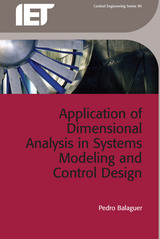
Application of Dimensional Analysis in Systems Modeling and Control Design
Pedro Balaguer
The Institution of Engineering and Technology, 2013
Dimensional analysis is an engineering tool that is widely applied to numerous engineering problems, but has only recently been applied to control theory and problems such as identification and model reduction, robust control, adaptive control, and PID control.
[more]

Applied Control Theory
J.R. Leigh
The Institution of Engineering and Technology, 1987
'To the surprise of some undergraduates, processes do not carry labels marking their variables nor, alas, are they conveniently classified into linear, nonlinear, stochastic, etc., categories. The ability to come to terms with this situation is a prerequisite for anyone proposing to succeed in an industrial environment.' This quotation from Chapter 1 characterises the viewpoint of the book, which is concerned with the application of control theory to real problems in their industrial context.
[more]

Control Engineering Solutions
A practical approach
P. Albertos
The Institution of Engineering and Technology, 1997
This book collects together in one volume a number of control engineering solutions, intended to be representative of solutions applicable to a broad class of control problems, and outlines possible alternative approaches to finding them. This is neither a control theory book nor a handbook of laboratory experiments, although it includes both the basic theory of control and practical laboratory set-ups to illustrate the solutions proposed.
[more]
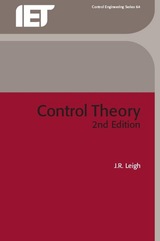
Control Theory
J.R. Leigh
The Institution of Engineering and Technology, 2004
Concise highly readable book emphasising the concepts and principles that are prerequisite for understanding both traditional and recent control theory.
[more]
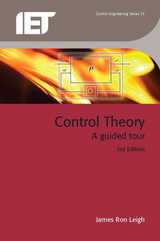
Control Theory
A guided tour
James Ron Leigh
The Institution of Engineering and Technology, 2012
Using clear tutorial examples, this fully updated new edition concentrates on explaining and illustrating the concepts that are at the heart of control theory.
[more]
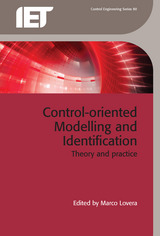
Control-oriented Modelling and Identification
Theory and practice
Marco Lovera
The Institution of Engineering and Technology, 2015
This comprehensive book covers the state-of-the-art in control-oriented modelling and identification techniques. With contributions from leading researchers in the subject, Control-oriented Modelling and Identification: Theory and practice covers the main methods and tools available to develop advanced mathematical models suitable for control system design, including: object-oriented modelling and simulation; projection-based model reduction techniques; integrated modelling and parameter estimation; identification for robust control of complex systems; subspace-based multi-step predictors for predictive control; closed-loop subspace predictive control; structured nonlinear system identification; and linear fractional LPV model identification from local experiments using an H1-based glocal approach.
[more]
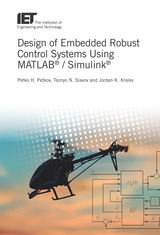
Design of Embedded Robust Control Systems Using MATLAB® / Simulink®
Petko Hristov Petkov
The Institution of Engineering and Technology, 2018
Robust control theory allows for changes in a system whilst maintaining stability and performance. Applications of this technique are very important for dependable embedded systems, making technologies such as drones and other autonomous systems with sophisticated embedded controllers and systems relatively common-place.
[more]

Design of Modern Control Systems
D.J. Bell
The Institution of Engineering and Technology, 1982
This book presents developments in analysis and design techniques for control systems. Included are exciting results for feedback systems using complex variable methods, the important concept of robustness in controller design and the increasingly important topic of decentralized control for large scale systems. These and many other contributions illustrate the great activity and rapid progress which has taken place in the subject over the past few years. Only by bringing these contributions together under one cover can the practising engineer in industry and indeed the engineer in university or polytechnic keep fully informed on the 'state of the art' on a number of different fronts. Application of the theoretical developments and practical aspects of the subject are not forgotten; analysis and design of a nuclear boiler and some direct digital control system design procedures are but two topics discussed in the present book. Several of the chapters are followed by problems on the subject matter and worked solutions to most of these problems are given at the end of the book. This aspect will find favour with many readers since such contributions are often a great help in the understanding of the subject matter.
[more]

Deterministic Control of Uncertain Systems
A.S.I. Zinober
The Institution of Engineering and Technology, 1990
One of the main fields of study in the control of dynamical systems has been the effective control of time-varying systems with uncertain parameters and external disturbances. In contrast to stochastic adaptive controllers with identification algorithms, the deterministic control of uncertain time-varying systems has a fixed nonlinear feedback controller, which operates effectively over a specified magnitude range of a class of system variations. If the variations satisfy certain matching conditions, complete insensitivity to system uncertainties can be achieved. The two main approaches are Variables Structure and Lyapunov control. The contents of this book reflect the research output of many authors. The chapters include material of an introductory nature as well as some of the latest research results. Attention has also been focussed upon some of the main areas of application, which include electric motor drives, robotics and flight control systems. The book should prove useful to control designers, theoreticians and graduate students.
[more]

Developments in Control Theory Towards Glocal Control
Li Qiu
The Institution of Engineering and Technology, 2012
Glocal control, a term coined by Professor Shinji Hara at The University of Tokyo, represents a new framework for studying behaviour of complex dynamical systems from a feedback control perspective. A large number of dynamical components can be interconnected and interact with each other to form an integrated system with certain functionalities. Such complex systems are found in nature and have been created by man, including gene regulatory networks, neuronal circuits for memory, decision making, and motor control, bird flocking, global climate dynamics, central processing units for computers, electrical power grids, the World Wide Web, and financial markets. A common feature of these systems is that a global property or function emerges as a result of local, distributed, dynamical interactions of components. The objective of 'glocal' (global + local) control is to understand the mechanisms underlying this feature, analyze existing complex systems, and to design and create innovative systems with new functionalities. This book is dedicated to Professor Shinji Hara on the occasion of his 60th birthday, collecting the latest results by leading experts in control theories to lay a solid foundation towards the establishment of glocal control theory in the coming decades.
[more]
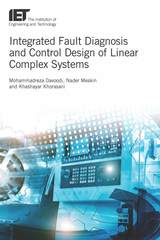
Integrated Fault Diagnosis and Control Design of Linear Complex Systems
Mohammadreza Davoodi
The Institution of Engineering and Technology, 2018
As control systems become more complex and are expected to perform tasks in unknown and extreme environments, they may be subject to various types of faults in their sensors, actuators or other components. It is crucial to be able to diagnose the occurrence of faults and to repair them in order to maintain, guarantee, and improve the overall safety, reliability, and performance of the systems. This book addresses the design challenges of developing and implementing novel integrated fault diagnosis and control technologies for complex linear systems.
[more]
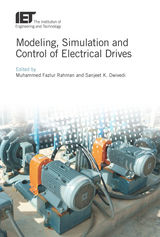
Modeling, Simulation and Control of Electrical Drives
Mohammed Fazlur Rahman
The Institution of Engineering and Technology, 2019
Thanks to advances in power electronics device design, digital signal processing technologies and energy efficient algorithms, ac motors have become the backbone of the power electronics industry. Variable frequency drives (VFD's) together with IE3 and IE4 induction motors, permanent magnet motors, and synchronous reluctance motors have emerged as a new generation of greener high-performance technologies, which offer improvements to process and speed control, product quality, energy consumption and diagnostics analytics.
[more]
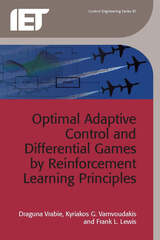
Optimal Adaptive Control and Differential Games by Reinforcement Learning Principles
Draguna Vrabie
The Institution of Engineering and Technology, 2012
This book gives an exposition of recently developed approximate dynamic programming (ADP) techniques for decision and control in human engineered systems. ADP is a reinforcement machine learning technique that is motivated by learning mechanisms in biological and animal systems. It is connected from a theoretical point of view with both adaptive control and optimal control methods. The book shows how ADP can be used to design a family of adaptive optimal control algorithms that converge in real-time to optimal control solutions by measuring data along the system trajectories. Generally, in the current literature adaptive controllers and optimal controllers are two distinct methods for the design of automatic control systems. Traditional adaptive controllers learn online in real time how to control systems, but do not yield optimal performance. On the other hand, traditional optimal controllers must be designed offline using full knowledge of the systems dynamics. It is also shown how to use ADP methods to solve multi-player differential games online. Differential games have been shown to be important in H-infinity robust control for disturbance rejection, and in coordinating activities among multiple agents in networked teams. The focus of this book is on continuous-time systems, whose dynamical models can be derived directly from physical principles based on Hamiltonian or Lagrangian dynamics.
[more]

Prediction and Regulation by Linear Least-Square Methods
Peter Whittle
University of Minnesota Press, 1963
Prediction and Regulation by Linear Least-Square Methods was first published in 1963. This revised second edition was issued in 1983. Minnesota Archive Editions uses digital technology to make long-unavailable books once again accessible, and are published unaltered from the original University of Minnesota Press editions.During the past two decades, statistical theories of prediction and control have assumed an increasing importance in all fields of scientific research. To understand a phenomenon is to be able to predict it and to influence it in predictable ways. First published in 1963 and long out of print, Prediction and Regulation by Linear Least-Square Methods offers important tools for constructing models of dynamic phenomena. This elegantly written book has been a basic reference for researchers in many applied sciences who seek practical information about the representation and manipulation of stationary stochastic processes. Peter Whittle’s text has a devoted group of readers and users, especially among economists. This edition contains the unchanged text of the original and adds new works by the author and a foreword by economist Thomas J. Sargent.
[more]

Singular Perturbation Methodology in Control Systems
D.S. Naidu
The Institution of Engineering and Technology, 1988
Many realistic engineering systems are large in dimension and stiff for computation. Their analysis and control require extensive numerical algorithms. The methodology of singular perturbations and time scales (SPTS), crowned with the remedial features of order reduction and stiffness relief is a powerful technique to achieve computational simplicity.
[more]
READERS
Browse our collection.
PUBLISHERS
See BiblioVault's publisher services.
STUDENT SERVICES
Files for college accessibility offices.
UChicago Accessibility Resources
home | accessibility | search | about | contact us
BiblioVault ® 2001 - 2025
The University of Chicago Press









